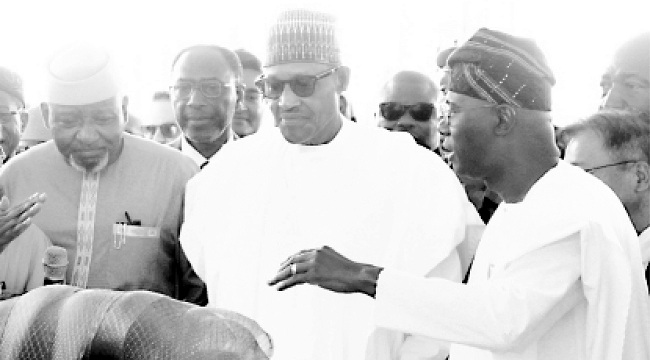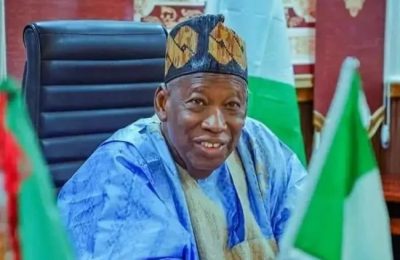
President Muhammadu Buhari was recently in Lagos to commission the $1.5bn Lekki Deep Seaport, heralding vast business opportunities that Nigerian indigenous operators might struggle to partake in, writes TOLA ADENUBI. Excerpts
For decades, Nigeria has had to rely on two major river ports, Apapa and Tin-Can ports, as its busiest ports, thereby losing cargoes to neigbouring deep seaports of Lome and Abidjan because these ports boast of deeper draft and could accommodate very large vessels.

With many cargoes destined for the Nigerian markets going to rival ports, trans-shipment activities thrived at these neigbouring ports of Lome and Abidjan and Nigeria’s ports were fed with crumbs that dropped from the tables of these neighbours for years.
However, with the commissioning of the Lekki deep seaport by President Muhammadu Buhari last Monday, Nigeria is set to are the bull by the horn and wrest back lost cargoes.
With a draft level of 16.5 meters, Lekki port can conveniently berth ultra large vessels that had hitherto found it difficult to come to Apapa or Tin-Can ports due to draft limitations.
Lekki ports three container berths, long dry bulk berths, and three liquid berths are expected to handle close to 1.5 million TEUs of containers annually and bring about increased business opportunities around the port.
Opportunities
One of the prominent opportunities that will abound at Lekki port is trans-shipment activities. In maritime, trans-shipment is when cargoes onboard a bigger vessel is being discharged onto smaller vessels before being taken to their various destinations.
With very large vessels expected at Lekki port, the port is expected to serve as a trans-shipment hub for cargoes destined for various ports in Nigeria, including Apapa, Delta and Calabar ports. Neigbouring West African ports in Benin Republic and Cameroon will also benefit from the expected trans-shipment activities that will abound at the Lekki port.
Aside trans-shipment activities, another opportunity that will thrive at Lekki port is increased barging activities due to the inter-modal efforts of the Federal Government towards cargo clearance from the new port.
While trans-shipment activities will benefit indigenous ship owners, increased barging activities will benefit Nigeria’s brown water operators and take more cargoes off the road.
Struggling indigenous operators
For many of Nigeria’s indigenous ship owners, participation in trans-shipment opportunities that will abound at Lekki port looks bleak for now due to a lack of capacity among the indigenous operators.
According to Emmanuel Ilori, a prominent member of the Nigerian Shipowners Association (NISA), , the inability to source for funds by indigenous ship owners is a major reason many will struggle to partake in the trans-shipment activities that are expected to boom at Lekki port.
According to Ilori, “There is no reason indigenous ship owners shouldn’t participate in short sea trade otherwise called trans-shipment business; this is one of those things that we have been advocating for many years now.
“Short sea trade can be more capital intensive because the operating cost can be very high. With the funding situation now for indigenous operators in Nigeria’s maritime sector, the situation can be very bleak.
“It is until we see improvement in the cost of borrowing funds in Nigeria’s shipping sub-sector, that is when we can start looking at such opportunities; start talking about indigenous ship owners benefiting from short sea trade activities that will abound at Lekki port.
“It is something that is desirable and we believe that it is doable because that is the only way we can build capacity among indigenous operators.
“In Nigeria, the cost of borrowing funds for maritime development is an issue. Funding is expensive in Nigeria now. Will the commercial banks in Nigeria be willing to lend funds to support short sea trade? This is the trend globally. Many financial institutions are backing short sea trade in China, Europe and the US. However, in Nigeria, funding is an issue. If the commercial banks will be willing to lend fund to support short sea trade has always been an issue. Now that Lekki port has come onboard, let’s hope things change for the better as regards funding.”
Also speaking with the Nigerian Tribune, President of the Ship Owners Association of Nigeria (SOAN), Dr Mkgeorge Onyuing explained that without ships for indigenous operators, the benefits that will abound at the Lekki port will be lost to foreign domination.
In the words of the SOAN President, “Lekki port coming onboard is a welcome development. However, when a nation establishes ports, it has to have its own shipping lines. Most countries of the world have their shipping lines.
“Government has a responsibility to ensure that the benefits that will accrue from Lekki port are not lost. And one of the ways to ensure this is to provide capacity for its indigenous operators by disbursing the Cabotage Vessel Financing Fund (CVFF).
“When short sea trade begins in Lekki port, and indigenous operators are found wanting, foreign ships will come and take away the money. We keep talking about Nigeria losing huge revenue through capital flight, if Nigeria fails to provide capacity for her indigenous operators, the nation will lose again.
“There are a lot of vessels that Nigeria needs. Starting from Tankers, to LPG Tankers, Container carrier, Barges, Bulk Carriers and even Ferries. Once we have these ships, shipping will move Nigeria’s economy forward. Shipping is the driver of global economy and Nigeria cannot be an exception.
“It is imperative that government takes the issue of capacity among her indigenous operators highly serious now that the Lekki port has been commissioned because immense benefits will arise from that port and the nation cannot afford to lose out again.”
Barging activities
Like the indigenous ship owners, local barge operators are skeptical of being involved in lifting of cargoes via the nation’s inland waterways from the Lekki port.
Speaking with the Nigerian Tribune, a member of the Barge Operators Association of Nigeria (BOAN) who wouldn’t want his name in print explained that the association is yet to get any response to series of letters written to Lekki Port.
“We have written to Lekki Port to pay them a courtesy visit. They are yet to respond to our letters. Now that Mr President has commissioned that port, we are waiting to see the barges that will be involved in cargo movement out of the port.
“We hope to be part of the barges that will be allowed to come into the port to lift cargoes, but between Lekki Port and the Nigerian Ports Authority (NPA) that should be sorted out very soon.”







